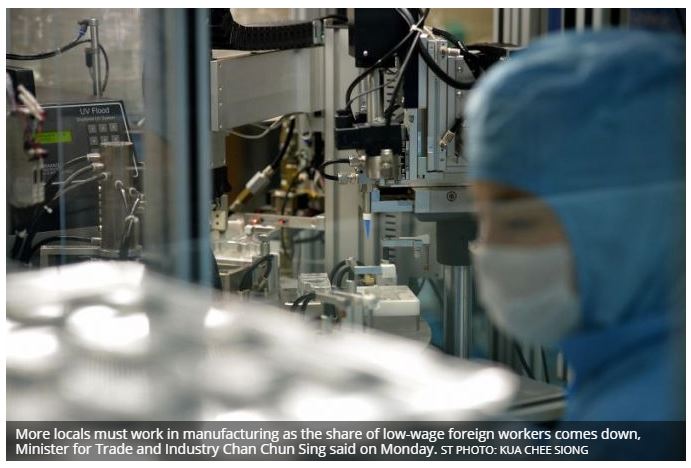Singapore manufacturing value must grow by 50% over next decade: Chan Chun Sing
MORE locals must work in manufacturing as the share of low-wage foreign workers comes down, Minister for Trade and Industry Chan Chun Sing said on Monday, while laying out a plan to hold steady the sector’s growth momentum into 2030.
He has set what he called a “very stretch target” of 50 per cent growth in manufacturing value over the next decade, the same pace of expansion as the last 10 years, but on a larger base.
That’s as “we are committed to maintaining a strong manufacturing base in Singapore”, Mr Chan said, in doubling down on a commitment that he said “has not changed”.
Under Mr Chan, the Ministry of Trade and Industry (MTI) intends to keep the manufacturing share of the economy at 20 per cent in the medium term, in line with the Committee on the Future Economy’s recommendation in 2017.
“Even prior to Covid, the forces of digitalisation, Industry 4.0, the reorganisation of the global supply chains were already in play,” said the minister during a visit to Venture Corp’s Univac Precision Engineering. “If anything, Covid has accelerated many of these trends.
“But this is also an opportunity for Singapore to reposition our manufacturing sector beyond aiming for that stretch target of quantitative growth. More importantly, we want to see the qualitative transformation of the Singapore manufacturing sector.”
The latest Manufacturing 2030 vision from the MTI, which Mr Chan announced on Monday, calls for a “more productive sector” that can boast a higher-skilled workforce and some of the world’s top production sites.
Singapore’s future manufacturing should feature market-leading companies not only in historical areas of strength, but also growth fields such as agri-technology, biotechnology and urban mobility, according to the MTI.
Growing the sector’s Singaporean workforce was identified as one key strategy in the roadmap to growth, as Mr Chan said that “we will have to achieve this with a much smaller manpower footprint”. Manufacturing now employs about 450,000 workers, or around 12 per cent of Singapore’s workforce, within his comfort zone of 10 per cent to 15 per cent.
But he warned: “The era whereby (sic) we can bring in cheaper foreign manpower, labour to augment the Singaporean workforce will increasingly become more difficult.
“So we will have to do this with possibly a smaller pool but a much higher-quality talent pool, so that we can go into the area of advanced manufacturing, whereby we complement the local workforce with high-quality machines, the depth of intellectual property required for such sector operations, and the kind of niche areas that we need to go into, that makes us hard to displace in the global value chain.”
As such, “we want more Singaporeans in manufacturing, across all levels and especially in critical roles”, Mr Chan said. “We will double down on efforts to develop our talent pipeline for the manufacturing sector.”
Efforts will include more collaboration with institutes of higher learning, especially in building technical skills for Institute of Technical Education and polytechnic graduates.
The government can also support schools and companies in improving career progression pathways and strengthening skills upgrading opportunities, he noted.
In the other two prongs of its strategy, the MTI plans to keep wooing “frontier investments” that can anchor Singapore in global value chains, as well as boost local manufacturing enterprises and the industry ecosystem.
Said Mr Chan: “We are also concerned with the mix of the manufacturing sector. In the past, many of the older generation of manufacturing, that depends on cost competitiveness, was contract manufacturing. Those will increasingly be displaced by cheaper alternatives in other countries.
“Instead, beyond the 50 per cent increase in value, we want to see a greater proportion of our manufacturing going into advanced manufacturing, where the competitiveness is not based on cost, but is based on the intellectual property that we can generate, the quality of the products, and the precision that we can provide for the sector.”
Source: https://www.businesstimes.com.sg/government-economy/singapore-manufacturing-value-must-grow-by-50-over-next-decade-chan-chun-sing


 English
English




